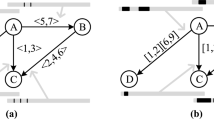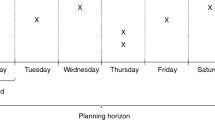Abstract
Several mobile computing applications require that both the order and location of occurrence of events be taken into account during decision making. Thus, processes need to track the location of nodes and synchronize their clocks. The Global Positioning System can be employed to mimic a global virtual clock that keeps the local clocks of participating nodes in synchrony with each other. The global virtual clock in conjunction with a space–time vector can track the mobility of nodes. Nodes can prioritize resource requests on the basis of request time as well as the requester's distance from the resource. Two distributed mutual exclusion algorithms that employ the space–time vector are presented. The error in the estimates of a mobile node, due to clock drift, about the region in which other mobile nodes may be present is formulated. Various resource allocation policies can react differently to such errors leading to performance differences. However, every policy should ensure that resource allocation has the properties of safety, deadlock freedom, liveness, and fairness.
Similar content being viewed by others
References
K. Arvind, Probabilistic clock synchronization in distributed systems, IEEE Transactions on Parallel and Distributed Systems 5(5) (1994) 474–487.
F. Cristian, A probabilistic approach to distributed clock synchronization, Distributed Computing 3 (1989) 146–158.
C. Fidge, Logical time in distributed computing systems, IEEE Computer (August 1991) 28–33.
R. Gusella and S. Zatti, The accuracy of the clock synchronization achieved by TEMPO in Berkeley UNIX 4.3BSD, IEEE Transactions on Software Engineering 15(7) (1989) 847–853.
Hoffmann-Wellenhof, B.H. Lichtenegger and J. Collins, GPS: Theory and Practice, 3rd ed. (Springer, New York, 1994).
H. Kopetz, Sparse time versus dense time in real-time systems, in: Proceedings of the International Conference on Distributed Computing Systems (IEEE Press, 1992) pp. 460–467.
H. Kopetz and W. Ochsenreiter, Clock synchronization in distributed real-time systems, IEEE Transactions on Computers (8) (1987) 933–940.
L. Lamport, Time, clocks and the ordering of events in a distributed system, Communications of the ACM 21(7) (1978) 558–565.
T. Logsdon, The Navstar Global Positioning System (Van Nostrand/Reinhold, New York, 1992).
L. Lundelius and N. Lynch, An upper and lower bound for clock synchronization, Information and Control 62 (1984) 190–204.
F. Mattern, Virtual time and global states of distributed systems, in: Proceedings of the International Workshop on Parallel and Distributed Algorithms, eds. M. Cosnard, P. Quinton, M. Raynal and Y. Robert (North-Holland, 1989) pp. 215–226.
A. Olson and K.G. Shin, Fault-tolerant clock synchronization in large multicomputer systems, IEEE Transactions on Parallel and Distributed Systems 5(9) (1994) 912–923.
R. Prakash and R. Baldoni, Architecture for group communication in mobile systems, in: Proceedings of the Symposium on Reliable Distributed Systems (IEEE Press, 1998) pp. 235–242.
R. Schwarz and F. Mattern, Detecting causal relations in distributed computing: in search of the Holy Grail, Distributed Computing 7(3) (1994) 149–174.
M. Singhal, A class of deadlock-free Maekawa-type algorithms for mutual exclusion in distributed systems, Distributed Computing 4 (1991) 131–138.
H. Takagi, Queuing Analysis, Vol. 1, Vacation and Priority Systems (North-Holland, 1991).
P. Verissimo, Ordering and timeliness requirements of dependable realtime programs, Journal of Real-Time Systems 7 (1994) 105–128.
Author information
Authors and Affiliations
Rights and permissions
About this article
Cite this article
Prakash, R., Baldoni, R. Causality and the Spatial–Temporal Ordering in Mobile Systems. Mobile Networks and Applications 9, 507–516 (2004). https://doi.org/10.1023/B:MONE.0000034704.13096.22
Issue Date:
DOI: https://doi.org/10.1023/B:MONE.0000034704.13096.22




